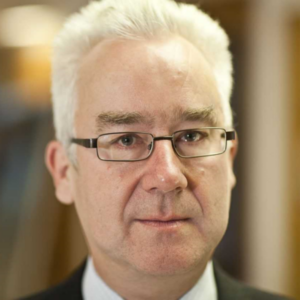
Social Work England’s interim chair has been reappointed after the government failed to recruit a permanent leader for the regulator’s board.
Andrew McCulloch, who was already on the Social Work England board, was appointed to the interim post in March 2023 following the resignation of founding chair Lord Patel of Bradford.
On appointing McCulloch, the Department for Education (DfE), which oversees the regulator, said that he would serve for “up to one year, standing down as soon as a substantive chair is in place and no later than 29 February 2024”.
However, despite advertising for a new chair in July 2023, the DfE has failed to appoint anyone to the £450-a-day role, in which the incumbent would be expected to serve 80 days per year.

Social Work England interim chair Andrew McCulloch
As a result, McCulloch, a former civil servant in the then Department of Health and ex-chief executive of the Mental Health Foundation, has had his appointment extended twice: for three months, from March to May 2024, and then for a further six months, from June until the end of November.
It is possible that a permanent chair will be appointed during the remainder of McCulloch’s current term. However, the recruitment process would need to be initiated by the new government, following the 4 July election, and would likely take several months.
Role of the board and chair
The role of the board is to oversee the running of Social Work England, review management performance, set the regulator’s strategic objectives, ensure it has the human and financial resources to meet them and make sure it complies with its statutory, regulatory and common-law duties.
The chair is responsible for leading the board, including by formulating its strategy, ensuring that it takes account of government guidance, promoting the effective and efficient use of staff and resources and delivering high standards of propriety.
The role also involves reviewing the work of the board and its members regularly and making sure that it has an appropriate balance of skills.
A recent external review of the board, commissioned by the regulator, received positive feedback about McCulloch, who is not a social worker, with fellow members and stakeholders saying he had brought structure and focus to the board.



 Bournemouth, Christchurch and Poole
Bournemouth, Christchurch and Poole  Hampshire County Council
Hampshire County Council  Oxfordshire County Council
Oxfordshire County Council  South Gloucestershire Council
South Gloucestershire Council  Wokingham Borough Council
Wokingham Borough Council  Webinar: building a practice framework with the influence of practitioner voice
Webinar: building a practice framework with the influence of practitioner voice  ‘They don’t have to retell their story’: building long-lasting relationships with children and young people
‘They don’t have to retell their story’: building long-lasting relationships with children and young people  Podcast: returning to social work after becoming a first-time parent
Podcast: returning to social work after becoming a first-time parent  How managers are inspiring social workers to progress in their careers
How managers are inspiring social workers to progress in their careers  Workforce Insights – showcasing a selection of the sector’s top recruiters
Workforce Insights – showcasing a selection of the sector’s top recruiters 

 Facebook
Facebook X
X LinkedIn
LinkedIn Instagram
Instagram
“…£450-day-role…..[for] 80 days per year…” What are front-line Social Workers paid?
Is Andrew McCulloch registered with Social Work England? When checked I could not find his name there.
Thanks David. No, he’s not a social worker. I’ve updated the story with that information.
Such a destructive, incompetent and unethical organisation. Ironic it is the SW regulator. I hope one of the first things Labour do is close SWE.
Thanks Mithran. The more qualified and experienced Social Workers in the management of SWE the better, especially in its investigations role. Then there might be a better understanding within SWE of the pressures, realities and difficulties faced by front-line Social Workers
Hear, hear! They need people with front-line social work experience. Who fully understand the bureaucratic challenges foisted on a disillusioned and burnt out workforce and the pressures that creates.
It took 12 months before SWE informed me of a complaint from a disgruntled parent after I had challenged their parenting. Then a further 17 months to undertake an investigation resulting in no further action and no issues as to my social work practice. What is social work about if not to challenge neglect? You receive a complaint and a lengthy investigation?
A startling revelation with need for concern?
That Social Work England, the regulatory body which regulates ‘professionally’ qualified social workers and also sets standards, is not led by a social worker. In honesty, I am not sure what response to make, except it cuts in various ways and suggest many implications, including;
1 – The transferable skills and ability of qualified social workers to work across and/or in different career sectors, including government, commerce..construction…other
2- The regulatory body SWE being largely a goverment bureaucratic machine, held together by ‘social work’ principles and knowledge frameworks.
3 – Confidence level and trust of social workers placing trust in a regulatory body and FTp investigation processes said not attuned to the issues and lived experiences on the ground.
4 – Transparency intentions of SWE full board reports (17.5.24) being published. In the recent reading, it is noted the majority/all board members are non executive directors with exception 1. Diversity agenda is said to be a continuing priority issue. The issue of FTP analysis of diversity data is being considered within context of data and insight strategy – but without any core answers yet.
There is a conversation to be had about ‘social work/ers’ and the different settings in which they work and impact. As a regulatory body, I am intrigued’ but not in total dispair the chair is not a social worker.